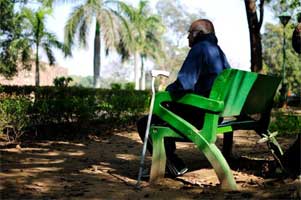- Home
- Editorial
- News
- Practice Guidelines
- Anesthesiology Guidelines
- Cancer Guidelines
- Cardiac Sciences Guidelines
- Critical Care Guidelines
- Dentistry Guidelines
- Dermatology Guidelines
- Diabetes and Endo Guidelines
- Diagnostics Guidelines
- ENT Guidelines
- Featured Practice Guidelines
- Gastroenterology Guidelines
- Geriatrics Guidelines
- Medicine Guidelines
- Nephrology Guidelines
- Neurosciences Guidelines
- Obs and Gynae Guidelines
- Ophthalmology Guidelines
- Orthopaedics Guidelines
- Paediatrics Guidelines
- Psychiatry Guidelines
- Pulmonology Guidelines
- Radiology Guidelines
- Surgery Guidelines
- Urology Guidelines
Eating enough protein helps delay age related disability

UK: Higher protein intake could help older people deal with disability, finds a new study published in the Journal of the American Geriatrics Society.
To live successfully and independently, older adults need to be able to manage two different levels of life skills: (1) basic daily care that includes feeding yourself, bathing, dressing, and going to the toilet on your own. and (2) basic housekeeping activities such as managing finances, and having the mobility to shop and participate in social activities.
Trouble in performing these two basic types of life skills could bring problems that can reduce life quality and independence. People 85-years-old and older form the fastest-growing age group in our society and are at higher risk for becoming less able to perform these life skills.
Read Also: Wearable device That can predict older adults’ risk of falling
Nuno Mendonça, Institute for Ageing, Newcastle University, Newcastle upon Tyne, United Kingdom, and colleagues conducted the study to determine whether protein intake is associated with better disability trajectories in the oldest adults (≥85) and whether muscle mass and muscle strength would partially mediate this.
Protein is known to slow the loss of muscle mass. Having enough muscle mass can help preserve the ability to perform daily activities and prevent disability. Older adults tend to have a lower protein intake than younger adults due to poorer health, reduced physical activity, and changes in the mouth and teeth.
Read Also: Thrombectomy reduces significant disability up to 24 hrs in stroke patients : NEJM
For the study, the research team used data from the Newcastle 85+ Study conducted in the UK. The researchers approached all people turning 85 in 2006 in two cities in the UK for participation. At the beginning of the study in 2006-2007, there were 722 participants, 60 percent of whom were women. The participants provided researchers with information about what they ate every day, their body weight and height measurements, their overall health assessment (including any level of disability), and their medical records.
Participants had 4 distinct disability trajectories (between the ages of 85 and 90: constant very low (AT1), mild (AT2), moderate (AT3), and severe (AT4).
Key Findings:
- One-quarter (28 percent) of very old adults in North-East England had protein intakes below the recommended dietary allowance.
- Each unit increase in protein (g) per kg of adjusted body weight (aBW/d) was associated with greater odds of AT1 and AT2 than of AT4 over 5 years in models adjusted for selected covariates.
- Participants with a protein intake of 1.0 g/kg aBW/d or more were more likely to belong to AT1 and AT2 than to AT4.
The researchers' theory was that eating more protein would be associated with slower disability development in very old adults, depending on their muscle mass and muscle strength.
As it turned out, they were correct. Participants who ate more protein at the beginning of the study were less likely to become disabled when compared to people who ate less protein.
"Our findings support current thinking about increasing the recommended daily intake of protein to maintain active and healthy aging," said Dr. Mendonca.
Older adults should aim to eat about 1.0 to 1.2 grams of protein for every 2.2 pounds of body weight. For example, for a person who weighs 160 pounds, that would be about 58 grams of protein a day (a 3.5-ounce serving of chicken contains about 31 grams of protein).
"Higher protein intake, especially 1.0 g/kg aBW/d or more, was associated with better disability trajectories in the oldest adults. These findings will inform new dietary strategies to support active, healthy aging," concluded the authors.
For further reference follow the link: https://doi.org/10.1111/jgs.15592

Disclaimer: This site is primarily intended for healthcare professionals. Any content/information on this website does not replace the advice of medical and/or health professionals and should not be construed as medical/diagnostic advice/endorsement or prescription. Use of this site is subject to our terms of use, privacy policy, advertisement policy. © 2020 Minerva Medical Treatment Pvt Ltd